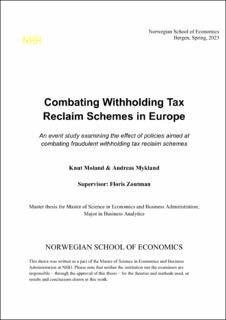| dc.description.abstract | In the last decade, numerous tax scandals have been exposed to the public. Among the
largest of these is the so-called CumEx scandal, which revealed how billions of euros have
been fraudulently acquired from European treasuries through trading schemes taking
advantage of loopholes in the dividend tax legislation. These schemes are the center of this
thesis. The first scheme, referred to as cum-ex, allows investors to obtain numerous tax
reimbursements for a single dividend withholding tax payment. The second scheme, known
as cum-cum, is a tax arbitrage strategy that exploits differences in dividend taxation rates
between domestic and foreign investors, thereby lowering the effective tax liabilities of the
participants.
This thesis contains an explanation of the inner workings of the schemes, an examination of
their prevalence in various European countries, and an analysis of the effects of policy
changes implemented to prevent the schemes from being executed. To assess the extent and
development of the schemes we utilize daily transaction volume data of shares to detect
abnormal trading activity around the ex-dividend date. Such abnormal activity is potentially
indicative of the presence of cum-cum and cum-ex schemes. We assess the impact of policy
changes taken to combat the schemes by comparing trading patterns around the ex-dividend
date before and after the implementation of said changes.
We analyze nine separate reforms in seven countries aimed at combating cum-cum and cumex
schemes. We find evidence of significant abnormal share trading around the ex-date in
five out of seven countries, indicative of dividend tax schemes being present. We find that
policy changes implemented in four out of nine reforms, in Germany (two separate reforms),
France, and Finland, have led to a significant decline in abnormal trading correlating with
that of known tax schemes. In the latter four countries, Austria, Belgium, Denmark, and
Norway, the implemented policy changes had no significant impact on trading patterns,
indicative of policy changes being ineffective in combating the cum-cum and cum-ex
schemes. | en_US |
